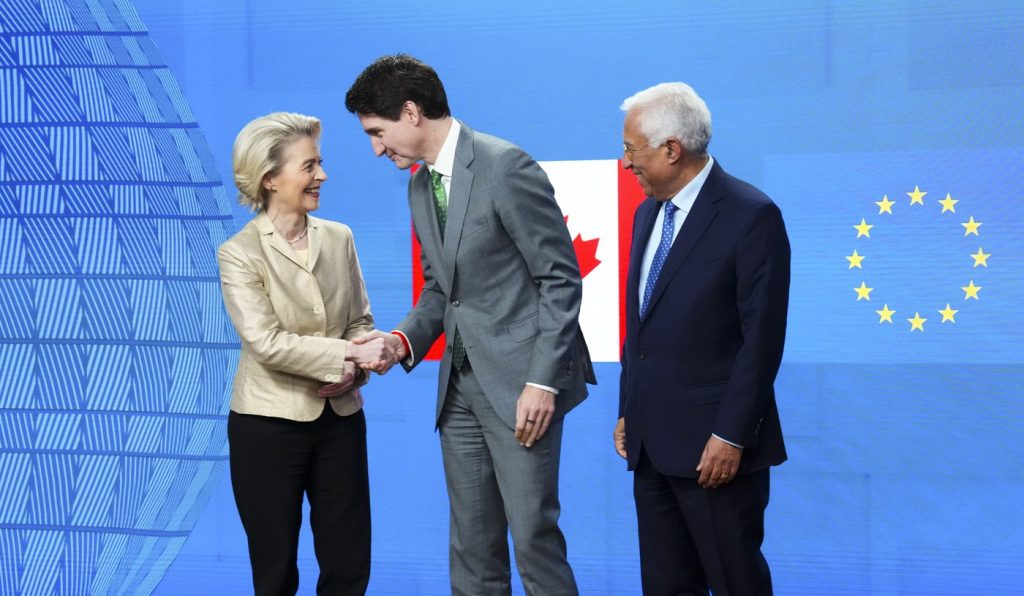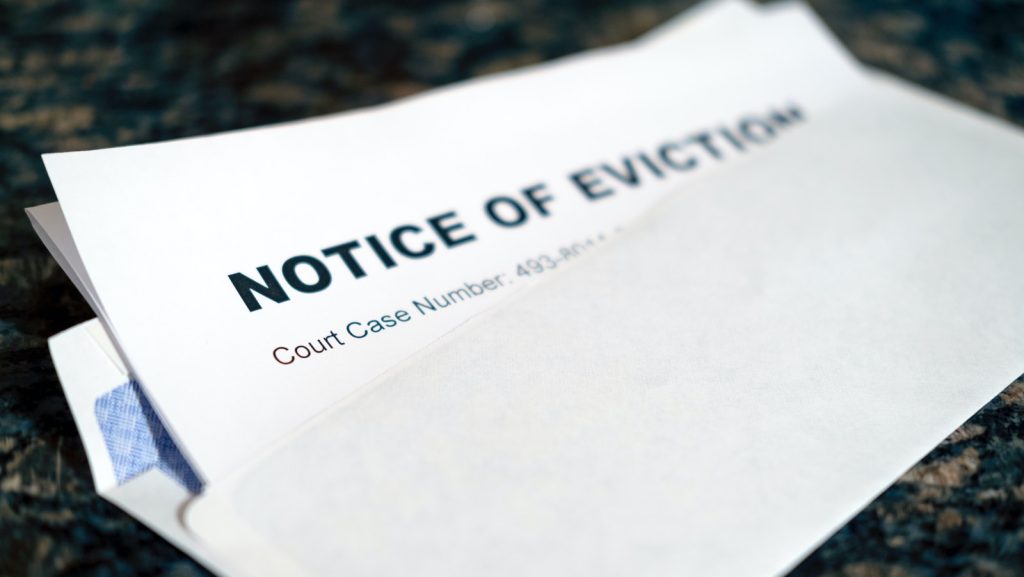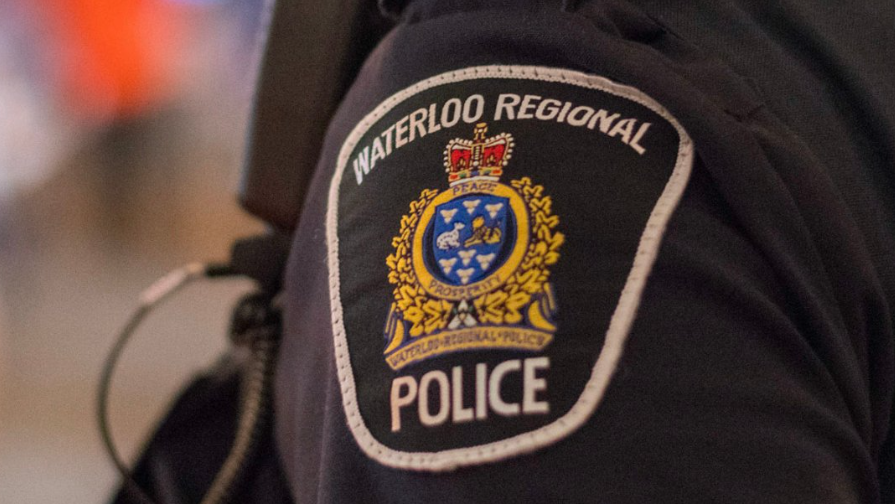Trudeau says Ukraine decides how war with Russia ends, praises buy-Canadian movement

Posted Feb 12, 2025 04:00:08 AM.
Last Updated Feb 12, 2025 03:48:11 PM.
BRUSSELS — It’s up to Ukraine to decide how the war with Russia ends, Prime Minister Justin Trudeau said Wednesday.
“It is only Ukrainians that get to decide what is acceptable to them as an outcome of any peace negotiations,” he told reporters Wednesday in Brussels as he wrapped up a visit to Europe aimed at deepening Canada’s trade and defence ties with the continent.
His comments came hours after U.S. Defence Secretary Pete Hegseth said it’s unrealistic for Ukraine to maintain the borders that existed before Russia’s 2014 invasion.
“Obviously people will have different perspectives around strategies, around positionings, but for us it’s very simple,” Trudeau said.
Trudeau met earlier in the day with NATO Secretary-General Mark Rutte and the European Union’s two most senior leaders, European Commission President Ursula von der Leyen and European Council President Antonio Costa.
The Prime Minister’s Office said in a media release that in their meeting, the three leaders reaffirmed their commitment to supporting Ukraine and spoke about expanding transatlantic trade.
“With increasing geopolitical instability and economic disruptions, including proposed U.S. tariffs, it is critical to accelerate these partnerships, now and into the future,” says the media release.
Trudeau’s one-day visit to the Belgian capital happened as U.S. President Donald Trump continued to threaten Canada’s economy with damaging tariffs and to call for Canada to become part of the U.S.
Trudeau, who returned to Canada following his meetings in Brussels Wednesday, said boosting trade with Europe is a way for Canada to limit the impact of American policies. He told reporters he’s inspired by Canadians shifting their purchasing choices away from the U.S.
“Quite frankly, the response of Canadians over these past weeks has been inspiring, as people have been there for each other,” he said.
“People have been changing their vacation plans, people have been looking at ways to buy Canadian, to support local businesses, to diversify their supply chains to places like Europe and Asia.”
But Trudeau did not have an explanation for the lack of widespread public comment from Canada’s allies pushing back on Trump’s verbal attacks on Canadian sovereignty.
“Canadians don’t need anyone else telling us that we have a great country,” he said. “People have been noting and actually impressed by how Canadians have all come together.”
Von der Leyen said in her welcoming remarks earlier in the day the story of Canada and the European Union is one of good allies and trusted friends, adding that “trust is very much needed in an unpredictable world.”
Trudeau said the EU-Canada Comprehensive Economic and Trade Agreement has created “tremendous prosperity on both sides of the Atlantic.”
“It’s something we’re very much talking about doing even more of in a reliable and trustworthy way,” he said in his remarks to media.
Ottawa has signed agreements to export hydrogen to Germany and has launched talks with Brussels on how Canada can supply critical minerals for things like electrical vehicles.
That collaboration might deepen as European leaders join Canadians in staring down Trump’s threats of damaging tariffs and territorial expansion.
Trump signed an order Feb. 1 to impose punishing tariffs on Canada — 10 per cent on energy and 25 per cent on all other imports — but paused them until March 4 pending what he called an effort to make an economic deal with Canada.
He also has repeatedly blasted EU policies and threatened to impose tariffs on European goods, singling out the European auto industry in particular.
The president’s repeated remarks about purchasing or annexing Greenland, which is part of the Kingdom of Denmark, have also prompted emergency meetings of EU leaders. Their concerns echo those of Trudeau, who said last week that Trump’s stated desire to make Canada a U.S. state is “a real thing.”
Trade between Canada and EU countries has been rising since the CETA trade deal came into force provisionally in 2017 — despite the fact that some countries, including Belgium and France, have avoided full ratification.
Trudeau said that deal, along with a strategic agreement with the EU that also took effect in 2017, helped Ottawa access COVID-19 vaccines and push back on Russian aggression.
“Nobody knew just how much turmoil lay ahead of us,” he said.
Trudeau’s Brussels visit followed a major artificial intelligence summit in Paris, where he said the Liberals plan to use Canada’s G7 presidency to advance AI and find clean ways to power it.
Ties between Canada and the EU could be further bolstered through a defence and security pact now being negotiated.
A Jan. 9 agenda for the EU council’s permanent representatives committee, which co-ordinates the body’s high-level plans, included an item seeking “authorization to negotiate” a protocol for an eventual “EU-Canada security and defence partnership.”
Brussels started forming security pacts with other countries last year, after taking up the idea in the wake of Russia’s full-scale invasion of Ukraine in 2022.
The EU signed deals with Japan and South Korea last November. They both called for “promoting concrete naval co-operation,” such as joint exercises, exchanging information on defence industries and allowing military vessels to dock for repair or resupply.
Brussels also has signed pacts with four European countries that aren’t part of the EU, focusing on issues like underwater infrastructure and border management.
Last September, Global Affairs Canada sent Foreign Affairs Minister Mélanie Joly a briefing note marked “for decision” with the topic “Security and Defence Partnership Between Canada and the European Union.”
The briefing note’s contents were redacted under exemptions to access-to-information law and the department would not describe the document’s contents, citing confidentiality.
“Canada and the EU have a strong and multi-faceted relationship, and this includes on security and defence issues,” the department wrote in a media statement.
Canada is already part of defence agreements with the EU that, among other things, allow it to move military equipment across EU borders to support Ukraine. It also has sent small numbers of officials to help with EU defence missions.
Trudeau’s visit to Brussels came as defence ministers from across the NATO military alliance gathered in the city, as did the Ukraine Defense Contact Group. Defence Minister Bill Blair is attending both meetings.
This report by The Canadian Press was first published Feb. 12, 2025.
Dylan Robertson and Anja Karadeglija, The Canadian Press








